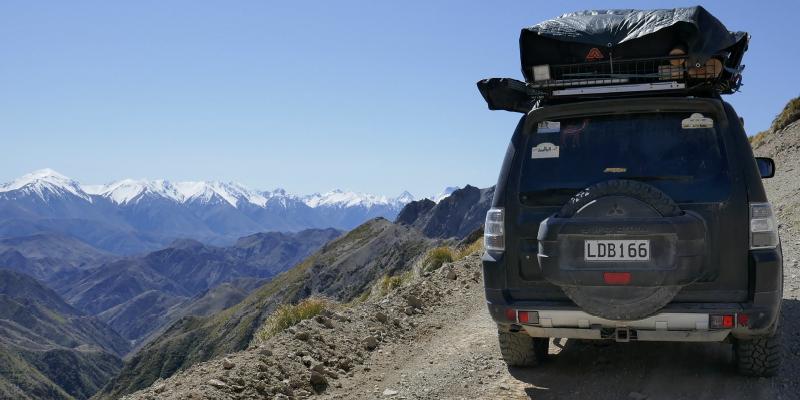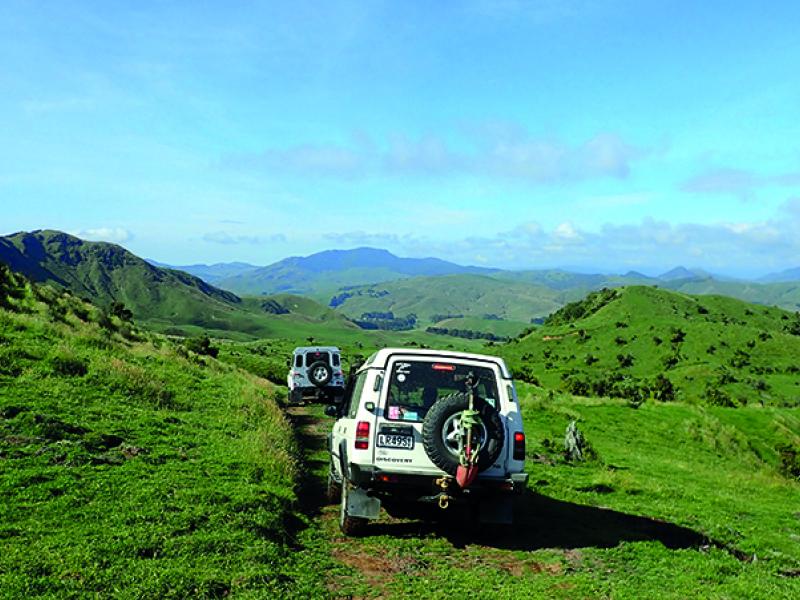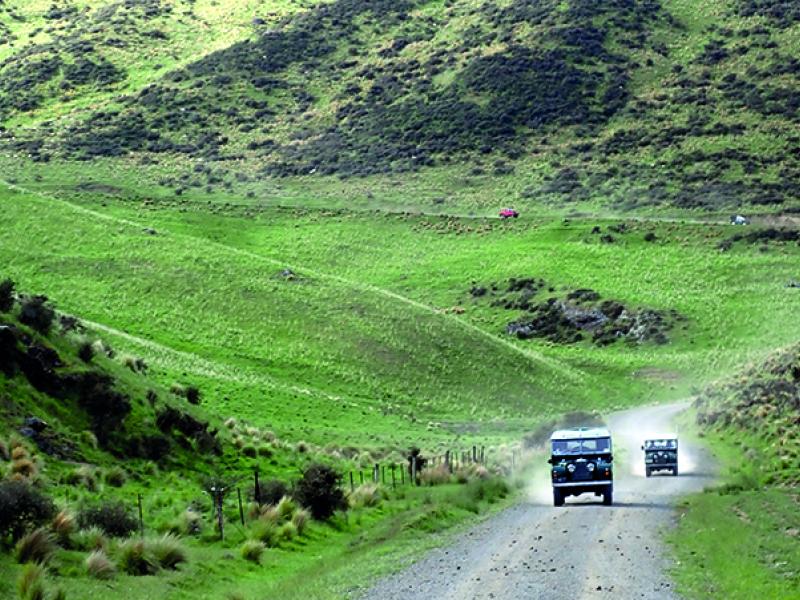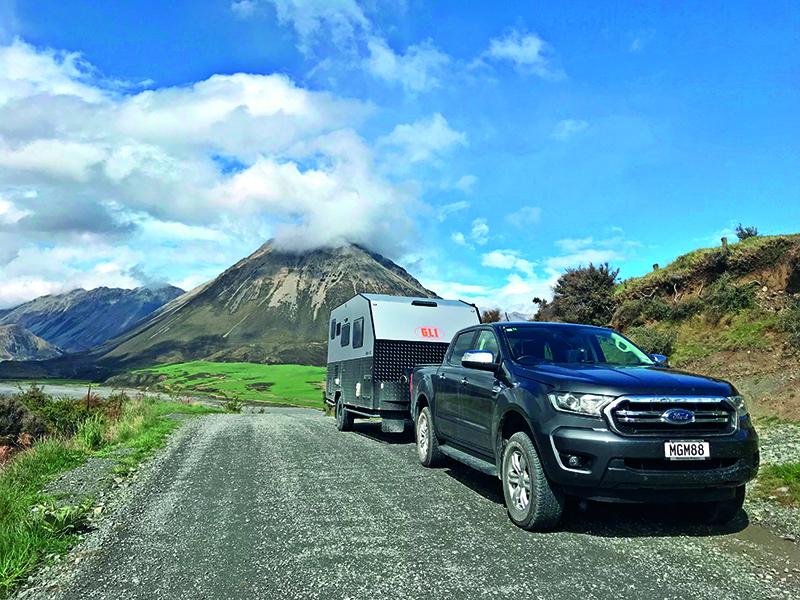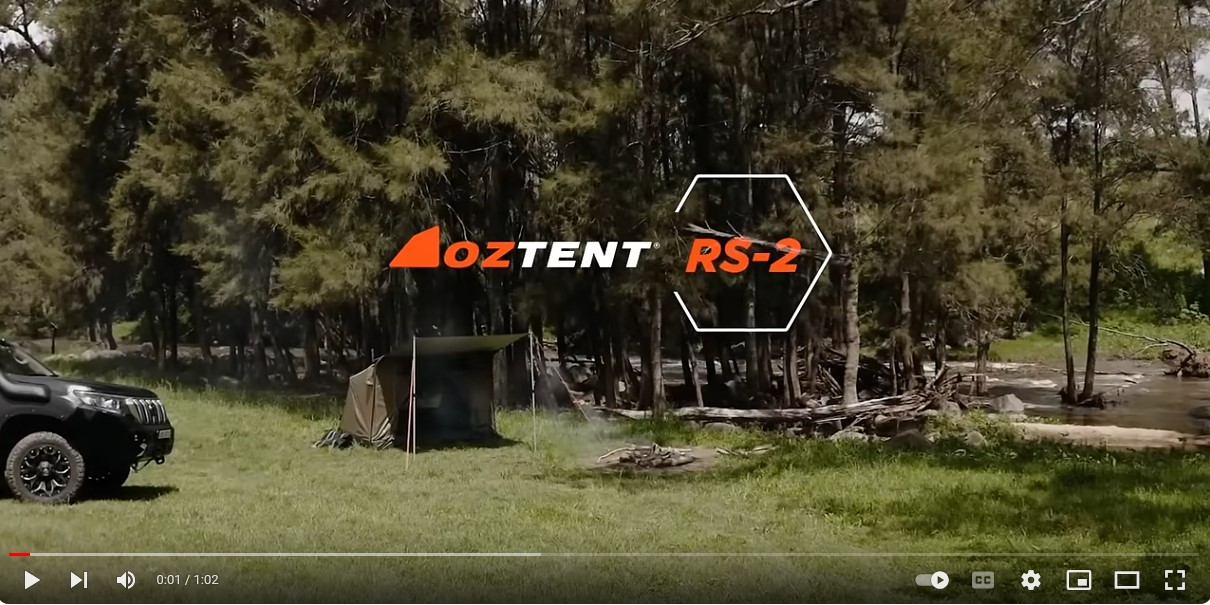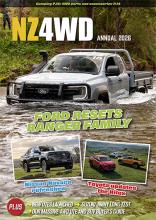Kiwi Aaron Rich took up serious 4WDing while on his OE in the UK. On his return home, therefore, he was able to see his homeland and its myriad off-road attractions, through fresh eyes.
I’ve clocked up quite a few miles touring on and off-road with my young family overseas; we’ve explored a number of countries between Morocco in North Africa, East and West Europe, the Balkans and as far as Turkey.
All this 4WD experience was gained overseas; in fact, prior to departing New Zealand to spend a decade working in London, I had done little 4WDing at home. I grew up in a Kiwi family that neither owned a 4WD, nor had the inclination to use one.
Despite this my zest for adventure and love of the outdoors had led me to pilot a Prado to Macetown a couple of times with some friends, in rather amateurish fashion admittedly, but that was about the extent of it. Consequently, when I returned home to New Zealand three years ago, bringing with me the same 4WD that I knew so well from my family’s foreign overland adventures, New Zealand suddenly became like an all new country to explore!
NZ’s ‘most epic’ adventures
I discovered that so many of this country’s ‘road ends’ are only truly the end of the road for cars; they’re so often the beginning of a marvellous adventure in a 4WD. I was determined to get out and see what New Zealand had to offer, and over the past three years I certainly have. Most of my exploring has been in the South Island, which is where some of New Zealand’s most epic off-road adventures are to be had.
A concern I had upon returning to New Zealand was whether I might feel restricted 4WDing in a small country with sea borders; i.e. in contrast to Europe, where we’ve crossed borders off-road high in the Alps, or in comparison to our routes through Morocco’s vast deserts, New Zealand’s borders are unquestionably the end of the road.
I was pleased to discover, however, that New Zealand’s world class wilderness is very accessible by 4WD Furthermore, some of the routes I will describe herein are long enough and remote enough to fully capture the essence of what 4WD overlanding is all about. And if that’s not enough you can then link a few routes together and construct some awesome mini expeditions in the South Island.
Something else I love about the South Island is its diversity. From the many river valleys that can be explored westwards as far as the Southern Alps permit, to the high-country vastness and rich history of Central Otago, or the seemingly impenetrable rain forests along the West Coast. The abundance of backcountry huts maintained by DOC is unique to New Zealand and usually means there is a bed waiting for you at the end of a day’s adventure. Though we usually prefer to camp in summer, in winter it’s a real treat to be able to continue exploring off-road by staying in a cosy hut equipped with a wood burner.
4WD overlanding is also safer in New Zealand than abroad. If you ever have to walk out you generally could, and you may even have the good fortune to pass by a number of DOC huts on your way. Break down or get stuck in 50+ degrees in the Moroccan desert, without shade, and you’d better be well-equipped and have an effective contingency plan!
Aaron’s Pick ‘n Mix
In this article I offer a selection of my favourite South Island routes. Some of these routes are well known to me, whilst others I completed for the first time in early 2019 as part of final vehicle testing ahead of my family’s expedition across Central Asia this year. (We’re driving overland from the Russian Far East to England; along the way visiting Mongolia’s Gobi Desert, retracing an ancient silk route through the 7,500 metre high Pamir mountains of Tajikistan, venturing out into the ‘ship graveyard’ that remains of the Aral Sea and much more beyond the Caspian Sea.)
I have produced videos for a number of the routes I’ve undertaken in New Zealand, which are available to view on my website: www.5gooverland.com/videos
Some of the accompanying photos show other of my favourite tracks not described in this article.
The Hopkins River Valley
Accessed south of Twizel at the head of Lake Ohau, this is a simply stunning river valley. I still recall the first time I drove up this valley – with tightly forested mountains, waterfalls streaming down and snow-capped mountains rising high above the valley, I turned to (my wife) Sylwia and proclaimed that the beauty of this place was right up there with the best of anything we’d experienced overseas; she agreed. And this remains one of my favourite places in New Zealand.
There are about six huts dotted up the valley, though DOC stipulates that you only take a 4WD as far as the first three. The first hut is on the true right of the river and should be accessible in just about any weather, but it’s not far enough up the valley to see the best of what’s on offer. Going further requires you to cross the river and drive up the river bed.
As with any South Island river, this is only advisable in the right conditions and with a keen eye on weather forecasts, as even if it’s OK to cross today it might not be possible to return tomorrow if there’s rain in the mountains. ‘Red Hut’, on the true left bank, makes a cosy hut to head for and has a lovely setting.
Winter can be a good time to explore South Island river valleys, as river levels are typically at their lowest.
Old Man Range to Old Woman Range
This is Central Otago high country at its best. It’s a huge area, characterised by its highly unusual rock formations, and offering several choices of routes and direction. I undertook a route from south to north, beginning from the DOC campsite at Piano Flat. That campsite, amidst beautiful surroundings, is situated at what would be the ‘road end’ for regular cars.
Getting from Piano Flat up onto the tops was once considered one of the roughest routes in the country, but since a bulldozer went over the top a couple of years ago it’s been tamed. It’s still not for ‘softroader’ SUVs however, as a real 4WD is needed to contend with a section referred to as the rock steps. These are a unique challenge – my video on this route shows the obstacle well.
It’s worth taking a detour to ‘Potters Hut’, where you can see two historic huts and read the DOC placards that will give you some appreciation of the extreme hardships faced by early gold miners in that area. Most will want to visit the large rock formation known as ‘Old Man Rock’ while they’re in this area.
Whilst we could have exited this area by taking one of two routes down towards Roxburgh or Alexandra, we instead back-tracked to pick up a less used route connecting the Old Man Range to the Old Woman Range. This gives the option of spending a night at Old Woman hut and then exiting down towards Cromwell. Although all 4WD routes are typically more enjoyable on clear blue sky days, this is one that you would really want clear skies to make the most of the views available from the elevation you’ll gain.
Macetown
This one just has to be on this list. It’s usually an easy 4WD trip, despite the more than 20 river crossings required (in typical conditions – the river is often low). It’s also a short route, taking just an hour from Arrowtown. You could do this as a day trip from Queenstown in a standard 4WD, but if you take your camping gear DOC permits free camping and it’s a great experience to spend a night in a place like this rather than just visit during daylight hours.
Be sure to explore a bit beyond Macetown itself – you can take your 4WD a few minutes further to the end of the track, where a collection of impressive gold mining relics and information can be seen. This includes a massive stamper battery. The autumn colours in this part of the country are most impressive.
The Oteake Conservation Area
This is one of my favourite places to explore by 4WD. It’s not just a route, but an entire conservation area with a truly remote feel. Several DOC huts are in the park and crystal-clear streams and rivers flow throughout – many with refreshing swimming pools that are worth stopping at on a hot day.
A standard 4WD is all that is needed, though some of the routes into and out of the area marked for experienced 4WDers may not please squeamish passengers, as being cliff edge can tend to raise anxieties. Also, less experienced drivers should not attempt to ascend at Johnstone’s Creek track – descending there will be far easier.
There are numerous tracks criss-crossing through the Oteake that can be explored; these often go to historic huts. These secondary tracks are in rougher condition than main tracks and can be more difficult, so be cautious with these. In good weather you could spend a few days up here soaking in the experience. I have a great recent video of the Oteake on my website.
Cluden – Lauder
Easements arranged by DOC permit 4WD travel between these two farm stations and offers a great 4WD shortcut between the Lindis Pass on State Highway 8 to just south of St Bathans. The Oteake sits just above St Bathans, making this route combinable with it. You’re likely to encounter mud bogs up on the top between Lindis Pass and the halfway point, though I found these manageable on all terrain tyres. The second half offers a harsh, but beautiful, rocky landscape with great views – see the photos. Gate code required via DOC website.
The Avoca Valley
Close enough to Christchurch to be easily accessible, this one makes the list because it’s a relatively short route that delivered more than I expected from it. After paying a $20 gate fee at the farm homestead you make your way up the Harper and then the Avoca Rivers.
This starts out with the scenery being very ‘Canterbury’, but by the time you get as far as Basins Hut (a DOC hut where you can spend the night or camp nearby) you’ll almost feel as if you were on the West Coast. Actually, you almost are!
It’s an easy one-night route that could make for a great weekend ex Christchurch and give you a complete change in scenery. I have a short video of this route on my website.
The Clarence Valley
Some will be put off by the $100 gate fee, but it is a beautiful and unique area. This area was seriously affected by the earthquakes. Some very nice DOC huts are to be found and the area is of historical farming interest – the old farm homestead and buildings are still there to explore.
This route starts by climbing up a zig-zag cliff edge track into the mountains. When we did it we were shrouded in thick cloud on the way up, but upon reaching the top it became obvious the cloud was all hanging on just one side of the mountains and once over the pass it was clear blue sunny skies all the way. The track is well maintained all the way down to the Clarence River.
When I visited, the track to Palmer Hut was inaccessible, but another headed the other direction to Goose Flat was ok. A word of warning though – some tracks in the area have an unusual soil content that goes from fine in the dry to instantly horrendous in the wet. When wet, the soil loses all structure and even a good mud tyre will struggle more than you might imagine.
A cliff edge track is not the place to be sliding about – definitely leave this one for dry weather!
Rainbow Road
This is the easiest route on this list, but not any less spectacular. It’s only open for a short period each year and there is a gate fee of $40. This is the only route on the list that can ordinarily be safely accomplished in a ‘softroader’ SUV as opposed to a true 4WD though conditions are subject to change. Indeed, I sometimes use this as a shortcut to tow my 1.8 tonne boat home, so it can’t be too difficult, even if I do get a few interesting stares.
If you’ve got a ‘softroader’, or just want to start out really easy with your first forays into 4WDing, then this route would be ideal. And there are great DOC campsites at Lake Tennyson and Coldwater Creek along the route, with a DOC hut situated in between. Beware the ferocious winds that come through Lake Tennyson at times.
If you have a real 4WD then you can take in side routes including the Maling Pass and Edwards Pass, however for these you’ll need to go online before you set off to register your vehicle and receive gate codes – a simple Google search will reveal the relevant DOC page.


